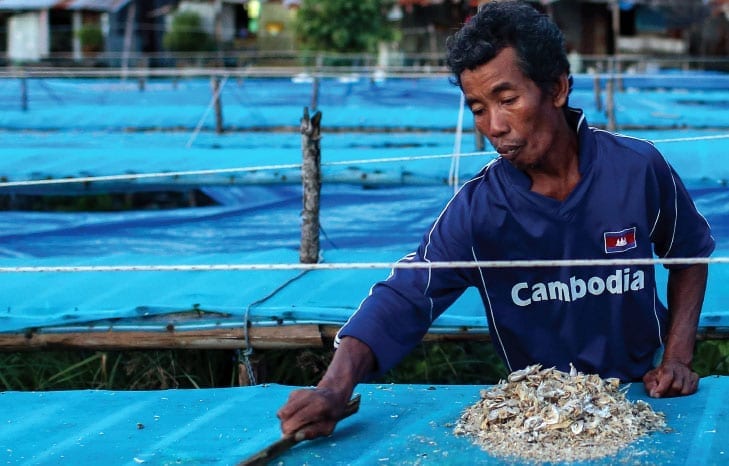
Mar 11, 2019
Suthasinee Kaewleklai, coordinator for Migrant Workers Rights Network (MWRN) in Thailand, recently was honored for her work by the National Human Rights Commission of Thailand (NHRCT).
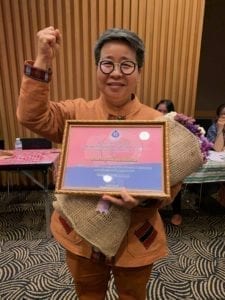
Suthasinee Kaewleklai, MWRN coordinator, recently was honored for her work by the National Human Rights Commission of Thailand (NHRCT). Credit: Solidarity Center/Robert Pajkovski
“Migrant workers are among the most vulnerable and abused workers in every country,” says Kaewleklai. “Worker rights are human rights, and migrant workers are entitled to fundamental rights without discrimination, including the freedom of association and collective bargaining. We will fight shoulder to shoulder with our sisters and brothers.”
Kaewleklai received the award during an NHRCT seminar last week, held in conjunction with International Women’s Day to honor women human rights defenders. The nonprofit MWRN, a Solidarity Center partner, has provided a crucial bridge between workers and access to legal redress for unpaid wages, occupational injuries and other forms of workplace abuse since it was founded in 2009.
“Whether they are protecting rights in the judicial process, fighting against impunity for rights violations, protecting democratic freedoms and the rights of communities and migrant workers, or fighting for freedom of expression, equality and the reduction of gender biases, their courageous stories are models and inspirations for future generations to learn and remember,” Angkana Neelapaijit, National Human Rights commissioner, said during the award ceremony.
Risking Physical, Verbal Assaults to Support Workers
Kaewleklai, a long-time trade unionist, began championing worker rights in the 1990s, when she worked at a factory in the Rangsit district, north of Bangkok. A co-founder of the factory’s union, she and other workers successfully challenged their employer’s refusal to regularly pay wages, and she successfully took legal action after the employer fired her and other union activists.
She later worked as coordinator for the Thai Labor Solidarity Committee, another Solidarity Center partner, and has championed the issues of working women, successfully campaigning to make International Women’s Day a national holiday.
At the MWRN, Kaewleklai advocates for the rights of migrant workers to form unions, negotiate with their employers for better working conditions, and urging lawmakers to ratify International Labor Organization standards on freedom of association and collective bargaining. She has helped migrant workers on chicken farms and elsewhere recover unpaid wages and attain safe working conditions.
She repeatedly has been verbally threatened, physically attacked and put under surveillance by state and non-state actors for her work to protect and promote labor rights and the rights of migrant workers. Currently, Kaewleklai, along with 14 migrant workers and other human rights defenders, is challenging criminal and civil charges filed by the poultry company, Thammakaset Company, following her advocacy on behalf of the company’s underpaid migrant workers.
Despite rulings by authorities and the courts against Thammakaset—including a January Supreme Court decision upholding a lower court ruling ordering Thammakaset to pay $53,600 to 14 former migrant workers for violations of the Labor Protection Act—the company continues to pursue charges against Kaewleklai and the others. Human rights defenders believe the charges are part of a strategy to harass human rights defenders and migrant worker rights advocates.
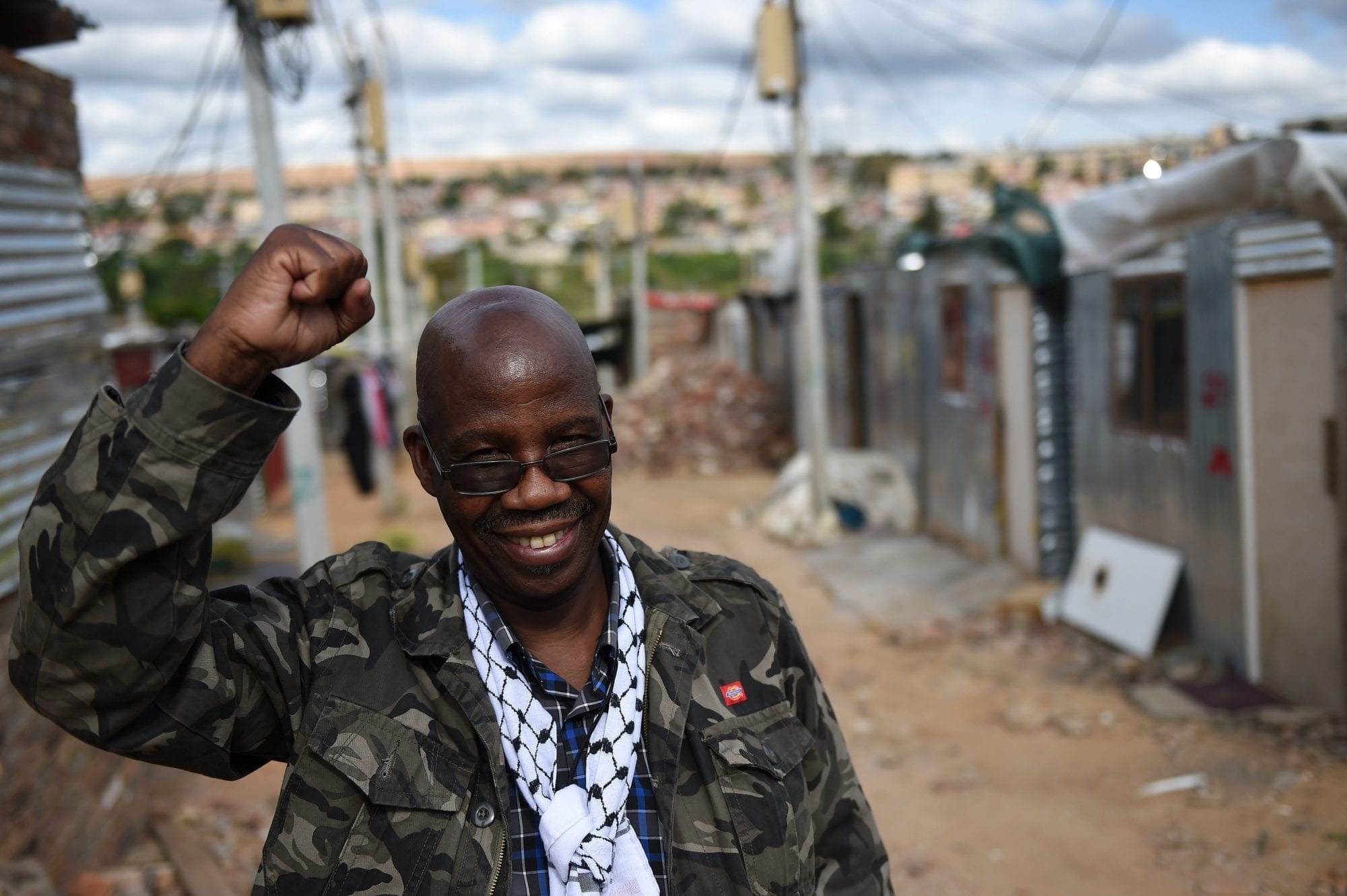
Oct 10, 2017
Freedom of peaceful assembly and association lie at the core of any functioning democratic system, according to a report by the new Annalisa Ciampi, the new United Nations (UN) Special Rapporteur on the rights to freedom of peaceful assembly and of association.
“It is the combination of the right to freedom of peaceful assembly and the right to freedom of association that strengthens responsive democratic governance systems and ensures the full and meaningful exercise of the right to participate in public affairs,” writes Ciampi in her first report to the UN General Assembly.

Annalisa Ciampi’s first report as UN Special Rapporteur finds that worker rights go hand in hand with democratic development. Credit: UN
Ciampi, whose three-year term as Special Rapporteur began May 1, is an attorney and a professor of International Law at the University of Verona in Italy, and a visiting professor of European Human Rights Law at the Monash University Prato Center in Italy.
Worker rights go hand in hand with democratic development, according to the report, with the Special Rapporteur emphasizing “the mutually reinforcing relationship between freedom of peaceful assembly and of association … and democracy and development.”
(Ciampi is moderating an October 17 panel, “Expanding Space within the United Nations,” an event co-sponsored by the Solidarity Center. The side event at the UN General Assembly meeting in New York City will bring together national representatives, UN bodies and civil society representatives to discuss strategies to more effectively promote and protect civic space in the UN system through the development of responsive and inclusive UN mechanisms and processes.)
Trade union rights are covered under the mandate of the UN Special Rapporteur and exist in numerous international standards, including the International Covenant on Civil and Political Rights. Unions have been working together with other civil society groups to highlight global restrictions on freedom of association and assembly.
In the new report, “Rights to Freedom of Peaceful Assembly and of Association,” Ciampi also outlines topics for upcoming reports, which include looking at how the rights to assembly and association are exercised in the context of multilateral institutions, and examining practices that promote and protect the right to form unions.
Ciampi plans to take an active role in strategic litigation cases before national, regional and international courts in cases relating to freedom of peaceful association and of assembly.
“As the Special Rapporteur previously reported, ‘workers face considerable opposition, harassment, stigmatization and even physical attacks’ in the exercise of these fundamental rights,” says Solidarity Center Legal Director Jeff Vogt.
“We welcome the commitment of Prof. Ciampi to use the legal authority of her office to intervene in support of workers’ rights in domestic litigation. Such interventions not only works to provide a remedy to workers, but also builds positive jurisprudence on the right to freedom of association.”
Previous UN Reports Examined Broad Range of Worker Rights Issues
Ciampi takes over from Maina Kiai, whose six-year term as Special Rapporteur saw a broad range of reports on the status of freedom of association in an era of global closing civic space. Among them, “The Rights to Freedom of Peaceful Assembly and of Association in the Workplace” found that without assembly and association rights, including the right to strike, workers have little leverage to change the conditions that entrench poverty, fuel inequality and limit democracy. Further, the report stated that discrimination, abuse and relegation to jobs at the bottom of the global economy undermine women workers’ ability to join and form organizations that defend their interests. Previous reports on freedom of association and assembly also looked at worker rights to form unions in countries such as South Korea, Chile and Kazakhstan, and examined issues that include the right to freedom of assembly and association in the context of elections and business.
A Special Rapporteur is an independent expert appointed by the UN Human Rights Council to examine and report back on a specific human rights theme or country situation. The mandate of the Special Rapporteur on freedom of peaceful assembly and of association includes studying trends, developments and challenges in relation to the exercise of these rights; making recommendations on ensuring their promotion and protection; and reporting on their violation, as well as on discrimination, threats or use of violence, harassment, persecution, intimidation or reprisals directed at those exercising these rights.
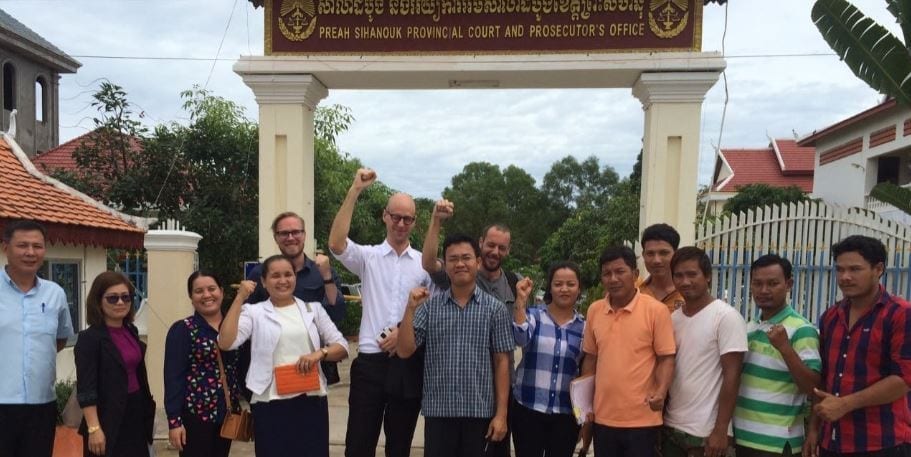
Jul 31, 2017
A $60,000 claim by Cambodia’s largest brewer against the Cambodian Food and Service Workers Federation (CFSWF) and its leader, Sar Mora, was dismissed this week by the Cambodian Provincial Court in Sihanoukville, putting an end to what the union alleges is the latest volley in the company’s years-long campaign to intimidate workers.
Cambrew, which is 50 percent owned by a Danish brewing conglomerate Carlsberg, had filed a civil case against the federation alleging damages for a spontaneous, five-day walkout by 100 workers in August last year.
CFSWF—co-represented by the Solidarity Center and Cambodian human rights and legal aid NGO Center for Alliance of Labor and Human Rights—welcomed the outcome of the legal case, but also said the suit and the court’s $3,000 fine against the leader of a second independent union, Democratic Workers Union, is further evidence a long-term campaign of intimidation by the company against workers.
Mora said the suit was an attack on workers’ right to fair representation and characterized the suit against himself and CFSWF as harassment—because he was personally named in the lawsuit and under Cambodian law could have been imprisoned if CFSWF failed to pay a fine imposed by the courts.
“I think the real cause [for the case] is that Cambrew doesn’t want our independent union in their company, and from time to time they make threats to our members, activists and union leaders,” he said.
CFSWF alleges that the legal attack represents a years-long pattern of hostile acts by the employer, including:
- Targeting CFSWF activists representing the interests of beer promoters, who are mostly young women working in bars and beer gardens to promote the employer’s brand. The company barred 11 union activists from returning to work in violation of an arbitration ruling allowing all the women to return, following a strike. CFSWF alleges employer retaliation against the women for opposing two measures imposed by the employer in early 2016, including the use of temporary contracts to deny permanent jobs with benefits such as paid maternity leave, as well as shifting the women’s hours to less desirable and potentially dangerous late-night hours, with no increase in pay.
- Excluding CFSWF from workplace consultation.
- Intimidating workers into not joining
- Offering some union members unspecified and secret compensation outside of negotiations with CFSWF, to avoid violating the labor law and having to pay severance.
- Targeting workers who belong to CFSWF for firing or layoffs, or subjecting them to last-minute shift schedule changes and less desirable positions inside the company.
- Targeting members of the independent union disproportionately in a round of layoffs last month that saw more than 200 workers lose their jobs.
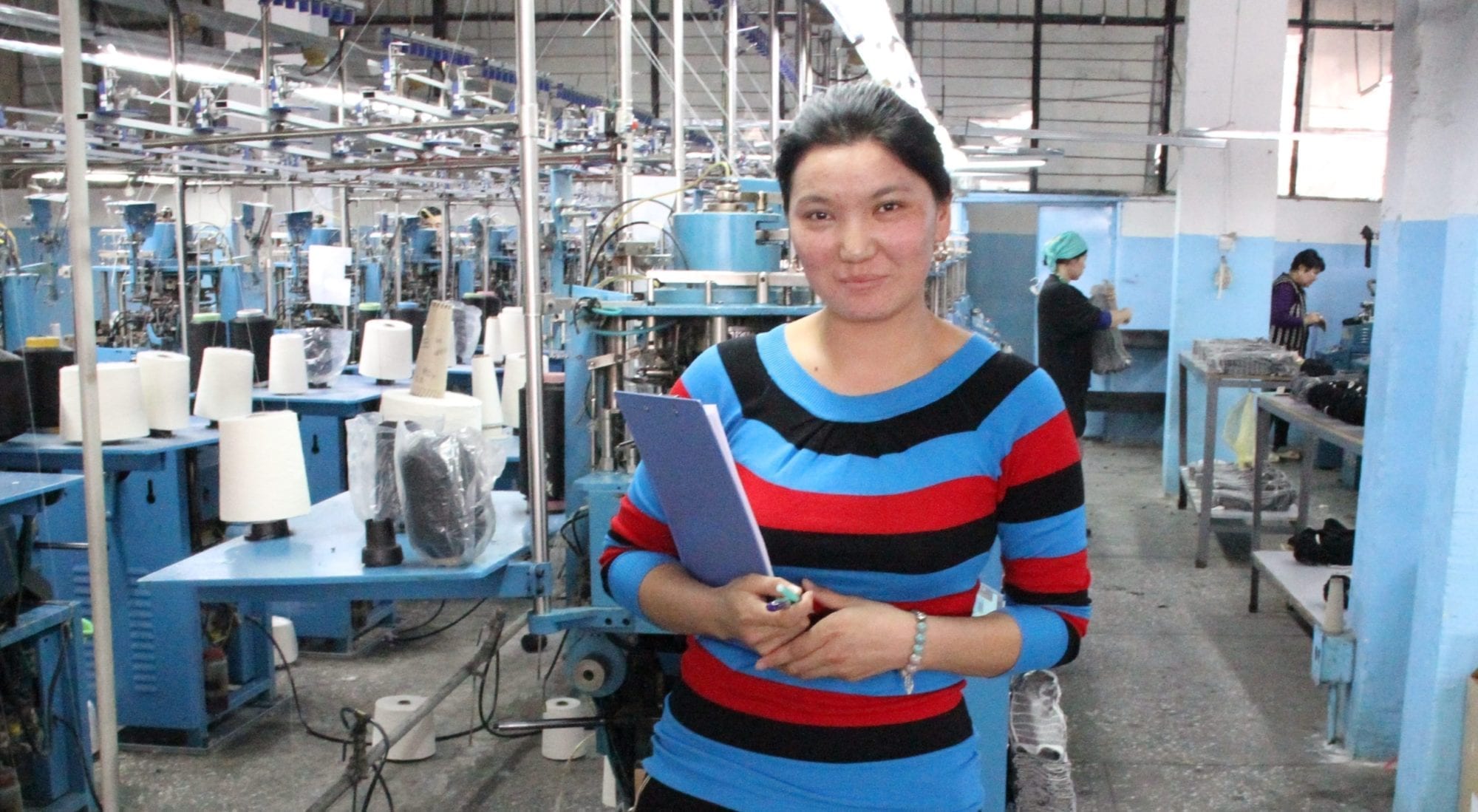
Jul 11, 2017
Kymbat Sherimbayeva was born in Naryn Oblast, a mountainous and very cold region of Kyrgyzstan where most people support themselves through cattle breeding. Seven years ago, 18-year-old Sherimbayeva left her village for Bishkek, Kyrgyzstan’s capital, seeking work.
Youth un- and underemployment stands at 55 percent in Kyrgyzstan. Most young people feel forced to migrate to Kazakhstan, Korea, Russia, Turkey or other countries in search of work, but some young people like Sherimbayeva hope to build their futures closer to home.
After arriving in Bishkek, Sherimbayeva found a job as a knitter at a hosiery factory, where she was soon promoted to head of quality control.
While working at the factory, Sherimbayeva says, she and her some 200 coworkers—of whom 90 percent are between the ages of 18 and 25—became increasingly concerned about inadequate wages and poor safety and health conditions.
With the help of trainings provided by the Garment Workers’ Union of Kyrgyzstan, with Solidarity Center support, workers at the factory realized they could negotiate improvements with management much more effectively as a group than as individuals. “We are stronger when we are together,” says Sherimbayeva.
Workers identified several activist leaders, including Sherimbayeva, who helped organize their coworkers into a union local. This year, workers are negotiating their first agreement with their employer, focusing on better wages and benefits. Sherimbayeva says that workers’ need higher wages because the average monthly salary of $200 does not cover basic expenses. She also hopes to help achieve for her co-workers paid sick leave and a year-end bonus, which are common to workers in Kyrgyzstan but not available to workers at their factory.
Since she and her co-workers organized, Sherimbayeva says they have found it much easier to negotiate improvements with factory management, even before a formal agreement is in effect. For example, in consultation with the union, factory management developed safety instructions for all departments and trained workers on those procedures; hired a local occupational safety and health service; provided protective clothing and other personal safety equipment; and now displays occupational safety and health information in prominent places throughout the factory building.
“Our position is much stronger concerning our labor as well as human rights. Together, we are able to defend workers in a much more effective way,” she says.
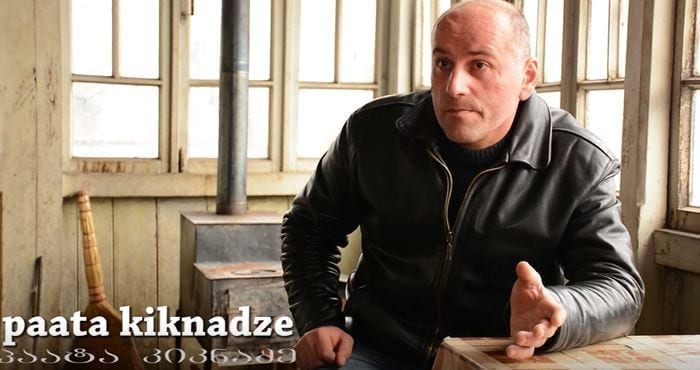
Jun 21, 2017
Nearly 200 railway construction workers in three villages in west Georgia won significant health and safety gains through two agreements with state-owned company China Railway 23rd Bureau Group, according to interviews with several workers in a new Georgian-language video. The company is under contract with the government to modernize Georgia’s Tbilisi-Rikoti railway route, including construction of seven tunnels.
Before the agreements took effect, workers at the construction site in Zvare referred to their section of the project as, “the hell tunnel.” In interviews, they describe how company managers ordered them to enter the tunnel before smoke and dust had cleared from rock-clearing blasts, and how they had not received protective masks and clothing, clean water on the job or paid sick leave.
“There was so much smoke that you cannot see a person in a [three foot] radius, but the attitude of employers is, ’work or go home,’”says one Zvare tunnel worker. “Working there [was] dangerous for life,” confirms Vitali Giorgadze, president of Georgia’s national independent union for railway workers, GRWNTU.
After the agreements took effect, workers reported significant health and safety improvements. “Current conditions are much better than they were before the trade union,” says welder Paata Kiknadze. The agreements committed the company to union-run health and safety monitoring and reporting systems at Zvare, Bezhatubani and Dzirula construction sites, which workers say is key to maintaining the health and safety measures.
With GRWNTU’s assistance, the settlements were reached last fall after workers walked off the job, first in Zvare and later at other construction sites along the route, to protest the firing of two Zvare workers who refused to enter a tunnel filled with scorching dust. Workers walked out again in November, after company representatives allegedly beat five workers in Zvare for, alleges company representatives, gathering firewood on company property.
Assisted by GRWNTU, workers at the Zvare, Bezhatubani and Dzirula construction sites organized into bargaining units, elected leaders and petitioned the Georgian government for assistance to ensure the company ceased violating Georgia labor law. Workers held protest rallies in September in the Georgian capital, Tbilisi, outside the offices of the Georgian Railway department and the Ministry of Labor, Health and Social Affairs of Georgia.
The agreements include additional benefits beyond health and safety improvements. “Before the strike, they did not have the right to [overtime pay and paid] leave,” says Paata Ninua, GRWNTU chief of staff and safety specialist trained under Solidarity Center’s Georgia program, funded by the U.S. Department of Labor. After the strike and the negotiations that followed, Ninua says, these problems were solved.







